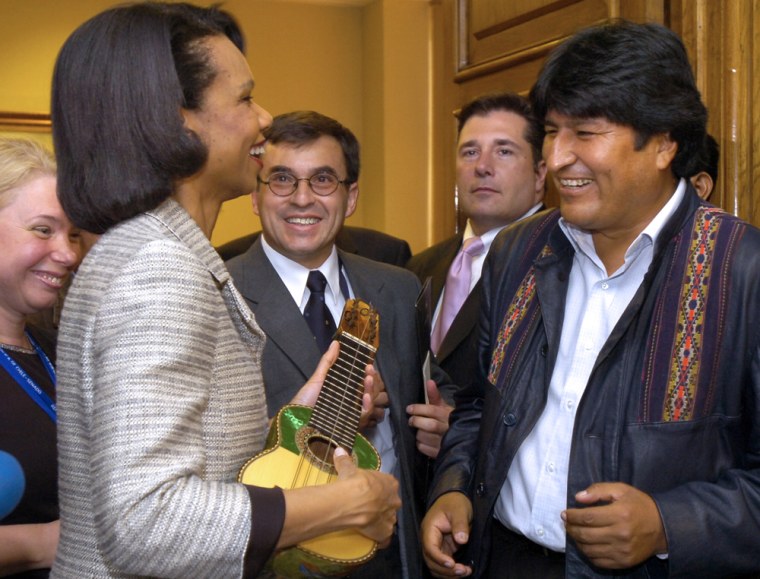Bolivia’s new president, Evo Morales, discussed his country’s fight against illegal drugs Saturday with U.S. Secretary of State Condoleezza Rice and then gave her a guitar decorated with coca leaves.
The leftist leader of the world’s third-biggest cocaine producer, who went into politics as the head of Bolivia’s coca growers group, greeted Rice warmly in their first meeting since he took office in January.
During his campaigning, Morales tagged himself a “nightmare” for Washington but a State Department official who attended the meeting described the atmosphere as friendly.
He said Rice had strummed the lacquered Bolivian instrument but it was unclear whether the top U.S. diplomat could take it home because of U.S. customs laws.
Drugs policy and trade with Latin America’s poorest country were the main issues discussed at the meeting in a tiny room on the sidelines of the inauguration of Chile’s first woman president, Michelle Bachelet.
“The U.S. and Bolivia must work together to counter the drug trade,” Rice told Morales, who was casually dressed in a leather jacket decorated with traditional embroidery.
“We want to have a good friendship with Bolivia and to help the Bolivian people prosper through encouraging expansion of trade opportunities,” Rice added.
The United States has been concerned that Morales will allow coca cultivation to increase in Bolivia. Coca is the main ingredient used in the production of cocaine and the United States funds programs to eradicate it.
The U.S. official said Morales stressed how important it was to have a positive relationship with the United States and said he was committed to fighting the drug trade.
The cultivation and sale of limited amounts of coca is legal in Bolivia but the United States contends excess production of the plant, the main ingredient for cocaine, eventually ends up on the illegal drug market.
Chavez’s shift in stance
During the election, Morales threatened to roll back U.S. efforts to curb coca growing, but has since urged farmers to respect a law limiting how much each family can grow.
Morales’s close ties with communist Cuba and Venezuelan President Hugo Chavez, who has called President Bush a terrorist, had initially made Washington skeptical over whether Bolivia’s first indigenous president was someone they could work with.
“We will always be open to dialogue. We can talk with Bush, but also with (Cuban President) Fidel Castro,” Morales said Friday.
Rice did not meet Chavez during Saturday’s celebrations for Bachelet and the U.S. minister left the inauguration from one side of the room while the Venezuelan went out of another.
Along with fellow Andean countries, Bolivia gets preferential trade tariffs from Washington as long as it cooperates in the war on drug-trafficking. That deal expires at the end of this year and Bolivia has not taken part in free-trade negotiations with the United States.
Morales this week accused the U.S. military of blackmail for cutting funding from a Bolivian anti-terror unit because it was unhappy about the commander of the force.
U.S. officials said military assistance was not discussed Saturday but Rice said before their meeting that she thought they could work through concerns.
Colin Bradford of the Brookings Institution said it was important for Rice to show Morales the United States viewed his election as democratic and was ready to work with him.
“It’s important that the United States try to keep communication channels open with Morales,” said Bradford
